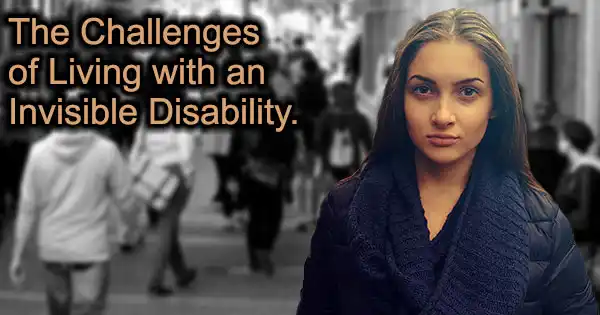The Challenges of Living with a Disability that is not Readily Apparent.
Life holds special challenges for those whose disabilities are not readily apparent.
Author: Attorney Lonnie Roach
Approximately 96% of people with a chronic medical condition are living with an illness that may be considered an invisible disability. An invisible disability is a mental, physical, or neurological condition that limits a person’s mobility, senses, or activities and is not obvious to other people – hence, “invisible.”

An invisible disability is a mental, physical, or neurological condition that limits a person’s mobility, senses, or activities and is not obvious to other people. Unfortunately, because these disabilities are not apparent, they may lead to misperceptions and misjudgments.
These people show no outward signs of illness and do not use an assistive device such as a cane or wheelchair, and act as if they have no medical problems.
Still, 10% experience symptoms that are disabling. Unfortunately, because these disabilities are not apparent, they may lead to misperceptions and misjudgments.
Some examples of invisible disabilities include:
- ADHD (Attention Deficit Hyperactivity Disorder
- Anxiety disorders
- Allergies
- Asperger Syndrome
- Asthma
- Autism
- Bipolar disorder
- Brain Injuries
- Chronic Fatigue Syndrome
- Chronic Pain Syndrome
- Crohn’s Disease
- Depression
- Diabetes
- Epilepsy
- Fibromyalgia
- Irritable Bowel Syndrome
- Lyme Disease
- Migraines
- Multiple Sclerosis
- Rheumatoid Arthritis
- Scleroderma
- Sleep Disorders
- Spinal Disorders
- Heart Conditions
- Seizure Disorders
A person who is in a wheelchair or carrying a white cane is easy to identify as having a disability, but individuals with a disability such as a vision or hearing impairment, who do not wear glasses or a hearing aid, are not.
73% of people with a severe disability do not use a device such as a wheelchair. Similarly, invisible disabilities such as fibromyalgia, sleep disorders, renal failure, and diabetes are not obvious.
Some symptoms and behaviors an individual with an invisible disability may experience include:
- Chronic Pain. A variety of conditions can cause chronic pain and limit a person’s activities severely. Chronic pain can be caused by back problems, bone disease, and physical injuries. The pain may not be noticeable to people who are unaware of the person’s condition.
- Chronic Fatigue. This condition causes a person to feel constantly tired and affects all areas of the person’s life – work, home, and social activities.
- Mental Illness. Some mental illnesses like depression, ADHD, schizophrenia or agoraphobia can be debilitating even though they may not be obvious to an onlooker.
- Chronic Dizziness. This condition is usually related to an inner ear problem and can cause problems walking, driving or working.
A person with an invisible disability may or may not seem disabled, but they still live with many challenges.
An invisible divisibility can hinder a person’s ability to work, attend school or social activities, or complete everyday tasks. They may work full or part-time, but at the end of the day have no energy for other activities. Others may not be able to work at all and may need assistance with everyday tasks and care.
Contact a Social Security disability attorney at 512-454-4000 for a free consultation and see if you can get disability benefits while suffering from an invisible disability. If you have been denied disability don’t give up!
While the invisible disability creates challenges for the disabled person, it can also be difficult for others to recognize and understand if there is no visible evidence of the condition.
A person with an invisible disability may be active in work or at school and be involved in hobbies or sports but still be limited or compromised in other areas of the lives. Because the limitation is not readily apparent people may misinterpret the disabled person’s needs and not know how to help. For example, a person who has a brain injury may be thought of as slow or lazy because their appearance is normal.
Invisible disabilities can cause special difficulties for students and children.
A student with ADHD or a psychiatric condition may need certain accommodations although they appear perfectly healthy and normal. Invisible disabilities are the most common type of disability in college students and individuals with an invisible disability are less likely to get a degree than a person who is not disabled. In light of these issues, educators, nonprofit organizations, and government agencies are continuing to develop policies and procedures to identify students with learning disabilities and help them progress and succeed.

Because of the social stigmas associated with disabled people, many employees do not disclose their disabilities.
A 2011 study reported that 88% of people with invisible disabilities had negative views of disclosing their disabilities to their employers and 2017 data from the Bureau of Labor Statistics stated the unemployment rate for people with an invisible disability is higher than those without a disability. The Americans with Disabilities Act protects the rights of all people with disabilities, including individuals with medical conditions that are not obvious. According to the ADA, a person with a disability “has a physical or mental impairment that substantially limits one or more major life activities, has a record of such impairment, or is regarded as having such an impairment.”
Some of the conditions listed above may prevent a person from working.
If you suffer from an invisible disability and it has impacted your ability to work, you may qualify for Social Security Disability benefits.
Disability benefits are an important source of income for those who are unable to work. If you not able to work due to accident or illness, you may be eligible for Social Security Disability or Long Term Disability benefits. If you have applied for benefits and been denied, contact the attorneys at Bemis, Roach and Reed for a free consultation. Call 512-454-4000 and get help NOW.
Obtaining disability benefits for Bipolar Disorder
Fibromyalgia and Applying for Disability Benefits
Depression and Qualifying for Social Security Disability


![]()
Your Free Initial Consultation
Call now:
At Bemis, Roach and Reed, if we can't help you, we will try to find the right attorneys for you.
We offer each of our prospective clients a free no obligation one hour phone or office consultation to see if we can help you and if you are comfortable with us. We know how difficult a time like this can be and how hard the decisions are. If we can be of assistance to you and help you find a solution to your issue we will, even if that means referring you to another attorney.
Let's get you Started:
If you could provide us with some basic information about your claim we will get right back with you with a free case evaluation and schedule your Free Consultation Today.
You can also email us at: contact@brrlaw.com
Kind Words from Our Clients
![]()
“The attorneys and staff at Bemis, Roach & Reed have provided me and my husband, Jeff, with stellar advice, care, and service. They made navigating the SSDI process easy, painless, and as timely as possible. During this difficult time in our lives it was a tremendous relief to know they were on our side and keeping us updated on next steps and timelines. We also had questions about my husband’s long term disability insurance and they helped us get those questions answered and resolved without any additional fee. I highly recommend Bemis, Roach & Reed.” – Kelli G
![]()
“I needed a lawyer for my case and had googled best lawyers. They came up first on my list and decided to give them a call. From the moment I called I knew I chose the right people. They said they would fight for me and fight they did. They knew what they were doing and kept good communication throughout the process. If you need someone that will listen, understand, and fight then these are the people. HIGHLY RECOMMEND.” – Marcel L.
![]()
“I’ve had a great experience working with Bemis, Roach & Reed for my disability case. I spent two years fighting on my own, until I was informed to look for a disability lawyer. Right away, sending in questions was a breeze, and from the moment my case was accepted, everything became a major weight off my shoulders. My newest appeal was filed for me, my medical records and case history sorted for me, and I could finally focus on my appointments and treatment with a little less worry. Everything was explained to me in a way that made sense, the process was set out in an easy to understand way. And, just like that, at the beginning of July 2023, my claim was accepted!” – Sunshinemutt





